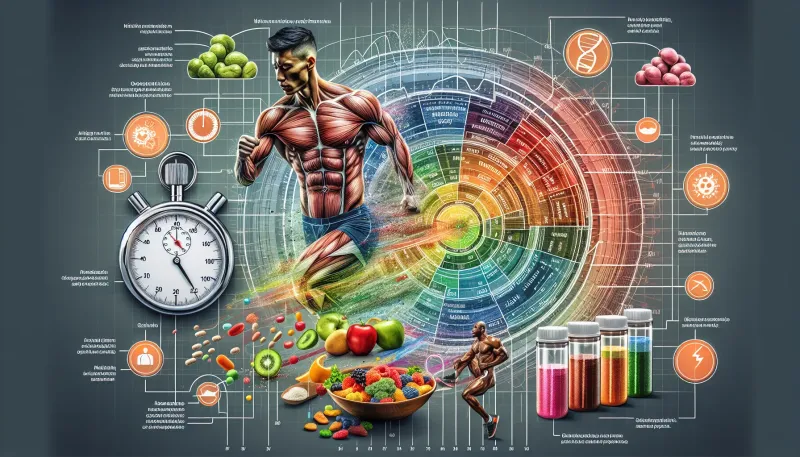Mastering Nutrient Timing and Recovery for Optimal Performance

Discover the importance of nutrient timing and recovery for enhancing athletic performance. Learn best practices, essential tips, and key nutrients for optimal recovery.
For athletes and fitness enthusiasts, optimizing performance goes beyond just training harder or longer. Nutrition plays a pivotal role in achieving peak performance and ensuring recovery. One crucial aspect often overlooked is nutrient timing and recovery. This article aims to provide a thorough understanding of how nutrient timing and recovery can enhance your athletic performance, giving you the tools and knowledge to take your game to the next level.
Understanding Nutrient Timing
Nutrient timing refers to the strategic consumption of nutrients—primarily proteins and carbohydrates—around your workout periods. This method maximizes muscle protein synthesis, enhances recovery, and improves overall performance. By providing your body with the right nutrients at the right times, you can significantly impact your training outcomes.
Pre-Workout Nutrition
Eating the right foods before a workout can set the stage for improved performance and reduced muscle breakdown. Aim to consume a balanced meal containing both carbohydrates and proteins about 2-3 hours before exercising. This combination provides sustained energy and supplies amino acids for muscle repair:
- Carbohydrates: Complex carbs like oatmeal or whole grains ensure a steady energy release.
- Proteins: Sources like chicken, fish, or plant-based proteins provide essential amino acids for muscle support.
Post-Workout Nutrition
What you consume after a workout is equally crucial. Post-exercise nutrition aims to replenish glycogen stores, repair muscle tissues, and kick-start muscle protein synthesis. The optimum window for post-exercise nutrition is within 30 minutes to 2 hours after training:
- Proteins: A protein-rich snack or meal promotes muscle repair and growth.
- Carbohydrates: Consuming simple carbs like fruits or sugar-rich vegetables helps quickly restore glycogen levels.
Key Nutrients for Recovery
Effective recovery is crucial for continuing to perform at your best. Nutrient timing is just one part of the equation, and knowing which nutrients to prioritize can make a significant difference.
Protein
Protein is fundamental in the recovery process as it aids in muscle repair and growth. Sources of high-quality protein include:
- Lean meats (chicken, turkey)
- Fish (salmon, tuna)
- Plant-based options (tofu, lentils)
Carbohydrates
Carbohydrates are essential for replenishing glycogen stores depleted during exercise. Include a mix of complex and simple carbs to ensure both immediate and sustained energy replenishment. Examples are:
- Whole grains (quinoa, brown rice)
- Fruits (bananas, berries)
- Starchy vegetables (sweet potatoes, carrots)
Fats
While often underrated, healthy fats are important for overall health and can help reduce inflammation. Good sources include:
- Avocados
- Nuts and seeds
- Oily fish, like salmon
Micronutrients
Vitamins and minerals also play a crucial role in recovery. Magnesium, potassium, and vitamin C are especially important for muscle function and strength:
- Magnesium: Found in green leafy vegetables, nuts, and seeds. It helps with muscle relaxation.
- Potassium: Found in bananas, oranges, and potatoes. It aids in muscle contractions and electrolyte balance.
- Vitamin C: Found in citrus fruits, strawberries, and bell peppers. It contributes to tissue repair and reduces inflammation.
Best Practices for Nutrient Timing and Recovery
Consistent Eating Schedule
Maintaining a consistent eating schedule can help regulate your metabolism and ensure your body has a steady supply of nutrients. Aim for balanced meals and snacks throughout the day.
Stay Hydrated
Hydration is often overlooked but is essential for nutrient absorption and overall recovery. Drink plenty of water throughout the day and consider electrolyte-replenishing drinks if you're engaging in intense exercise.
Listen to Your Body
Each person's nutritional needs are unique. Pay attention to how your body feels and adjust your nutrient intake accordingly. Consult with a nutritionist or dietitian if you're unsure about your specific needs.
Conclusion
Mastering nutrient timing and recovery is a game-changer for anyone serious about optimizing their athletic performance. By strategically consuming the right nutrients before and after workouts, leveraging the power of critical nutrients, and adopting best practices, you can enhance your performance, speed up recovery, and achieve your fitness goals more efficiently. Remember, consistency and paying attention to your body's signals are key components of this process. Take the time to implement these strategies, and you’ll likely see significant improvements in your performance and overall health.




















